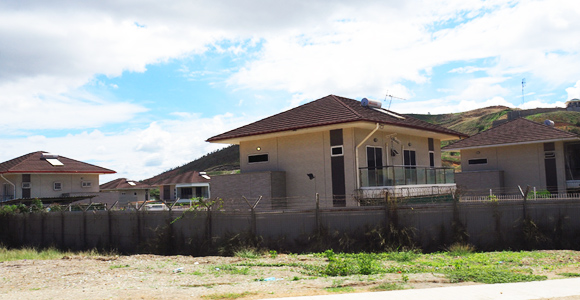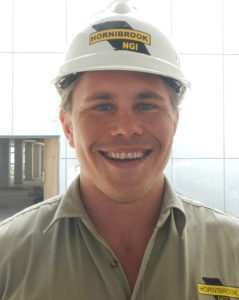The emerging middle class in Papua New Guinea is looking for better housing says Matthew Lewis, Managing Director of Hornibrook NGI. He tells Business Advantage PNG that the steel fabrication and building company sees great opportunity in the housing sector, despite currently difficult economic conditions.

A new housing project in Baruni, Port Moresby.
‘In PNG, there is an emerging middle class but the housing is not there,’ says Hornibrook NGI’s Matthew Lewis. ‘The accommodation that they get is extremely expensive and sub-standard.
‘I believe more organisations need to step up and try to make a difference—we have a responsibility to our country’s development, for goodness’ sake.’
‘There is huge demand for low maintenance, low income and affordable housing.’
‘So, what we are focusing on at the moment is property development.’
‘And there is huge demand for low maintenance, low income and affordable housing. That is what we are going to focus on for next year and the year after.’
Responsibility
Lewis says if the the company is able to supply good quality homes at an affordable price it will create a ‘win-win-win situation’.
‘In Lae, sentiment has been affected by prospects of mine activity.’
‘We get the work and the revenue; it is a win for the home owner because they get a high quality product at a very affordable price; and it is a win for the financial institutions as well.’
Lewis says the company is ‘doing quite well,’ although he acknowledges that they are not ‘hitting the milestones in the budget.’
Hornibrook has operations in steel fabrication, transport hire, bridge construction, labour hire and the Crossroads hotel in Lae. Lewis says the company has a high level of fixed assets.
‘Property development is the key for the next five-to-10 years.’
He says current economic conditions have been ‘a bit tough, but there is a good hype at the moment.’ In Lae, sentiment has been affected by prospects of mine activity commencing in Hidden Valley and Wafi Golpu.
‘With Hidden Valley, that is a big asset that Newcrest and Harmony have. Now, Harmony are looking to spend money to retain the efficiencies and longevity of their asset and we are looking to support them in that.
‘We have done a couple things like upgrade “shut downs” and corrosion management, and continue to focus on our long-term involvement.’
Aid

Hornibrook’s Matthew Lewis
Lewis says current economic conditions have made it harder to get work and the competition with foreign construction companies has been fierce.
‘What we have been doing is heavily focusing on Australian aid projects. We like it because the criteria is quite strict. We pride ourselves on our quality.’
Diversification
Lewis says the company’s hotel, Crossroads Transit Hotel in Lae, is busy.
‘Our strategy is to diversify and focus on property development because we have had great success there; we service the existing contracts we have and while tendering for other projects,’ he says.
‘I believe that emphasis on property development is the key for the next five-to-10 years.
‘In five years, I would say what we would probably do is split up the company a bit, as we continue to grow. So, rather than it being under the one banner you will have separate companies focused on a particular field.
‘So there will still be steel fabrication, that will end up becoming its own company. Hornibrook Construction will focus just on building construction and, rather than just having divisions, you will have independent companies that are autonomous.
‘One of the other major strategies we have is to be as vertically integrated as possible.’
People first
Lewis says the only thing that will not change for the future is the company’s ‘People First’ mantra. He is confident about the company’s management of people.
The company’s emphasis, which Lewis acknowledges is a stock standard metric, is on minimising turnover. He says the average tenure in Hornibrook is eight years.
‘It requires the training to make sure that everyone fully understands how to do their job and do it right.’
‘We continue to retain our staff. If employees have served with the company for more than three years, they and their immediate family are covered under our health insurance scheme.
‘We make sure that we give everyone in our staff—it doesn’t matter if they are an expatriate or a national—lunch every work day, proper safety equipment and transport to and from work.
‘The other thing we are focusing on now is training. We recently got the required NATTB [National Apprenticeship and Trade Testing Board] accreditation and we have built a state of the art training facility and are really trying to modernize business practices.’
Electronic era
Lewis says the company is aiming to move away from manual processes by becoming more electronic: ‘We still issue hard copy purchase orders, but that will cease shortly with the next upgrade of our Pronto accounting systems.
‘To advance and evolve, it requires the training to make sure that everyone fully understands how to do their job and do it right.
‘The other aspect that I focus on is to recruit and train high calibre nationals to take over positions from expatriates. Three out of our nine people within the executive team are Papua New Guineans.
‘At the end of the day, we are a family business, albeit we have other shareholders. But it is still a family environment. The biggest thing we try to do is to treat people the way we would like to be treated. I guess that is our ethos. It is simple stuff, but it matters.’








Speak Your Mind